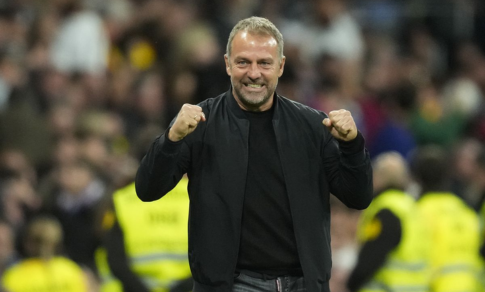Hansi Flick's journey with Barcelona has been nothing short of remarkable, particularly following a challenging period with the German national team and his entry into a financially troubled club. After leading the team to an impressive 4-0 victory against Real Madrid in the latest Clasico, he has successfully transformed Barcelona into one of the most thrilling teams in Europe.
Flick's tactical adjustments and ability to inspire have drawn attention, especially during a match where the reactions from opposing coach Carlo Ancelotti highlighted the tension and rivalry between the two teams.
Flick's impact was evident in the recent Clasico, where he portrayed himself as a steadying influence amidst the chaotic atmosphere surrounding him. While Barcelona's players celebrated exuberantly, Ancelotti's frustrations surfaced when one of Flick's assistants celebrated animatedly near the Real Madrid bench. Flick's composed response to Ancelotti showcased his maturity as a coach, positioning him as a central figure amid the emotions of such a high-stakes match.
Barcelona's commanding win over Real Madrid wasn't just about the scoreline; it symbolized a shift in power dynamics between the two clubs. The match marked a significant moment, as it was Barcelona's first 4-0 victory at the Bernabeu since March 2022.
The match also featured social media banter centered around Kylian Mbappé, further emphasizing the excitement surrounding Barcelona's performance. For the first time in years, fans sensed that Barcelona had regained their competitive edge, closing the gap to just six points in the league standings.
A significant aspect of Flick's success is his ability to work with a largely familiar squad, as most players have been part of the team for the previous season. While Dani Olmo's arrival added depth, the majority of the squad under Flick comprises the same players who struggled before his tenure. Unlike previous coaches, Flick has chosen to focus on maximizing the existing talent rather than lamenting the club's challenges. This adaptability has proven beneficial, allowing Barcelona to thrive despite injuries impacting their squad depth.
Flick's strategic changes have revitalized players like Marc-André ter Stegen, who stepped up to perform exceptionally well during the Clasico, even in the absence of experienced backup Wojciech Szczesny. This mirrors a broader trend in Spanish football, where national team coach Luis de la Fuente has encouraged a shift away from the rigid tiki-taka style, resulting in a more dynamic approach. Flick has similarly embraced a philosophy that allows for fluid attacking play and creativity, which has reinvigorated Barcelona's offensive capabilities.
The current squad's performance hinges not just on individual stars like Robert Lewandowski and emerging talents like Lamine Yamal but also on the contributions from the midfield. Players like Pedri have thrived under Flick's system, benefiting from a more traditional midfield role that allows for greater creative expression. This midfield dynamism has been key to Barcelona's resurgence, showcasing how Flick has successfully fostered an environment where both attackers and midfielders can excel.
As Barcelona progresses through the season, questions loom about the squad's overall endurance. Their only league defeat this season occurred after a grueling stretch of matches, highlighting the physical demands placed on the players. Flick has effectively managed the squad, relying on younger players to step up while navigating injuries to key contributors.
The challenge will be maintaining this balance throughout the season, particularly as they juggle both domestic and European competitions. Despite the encouraging signs of improvement, sustaining this momentum will be critical for their ambitions moving forward.








ADD A COMMENT :